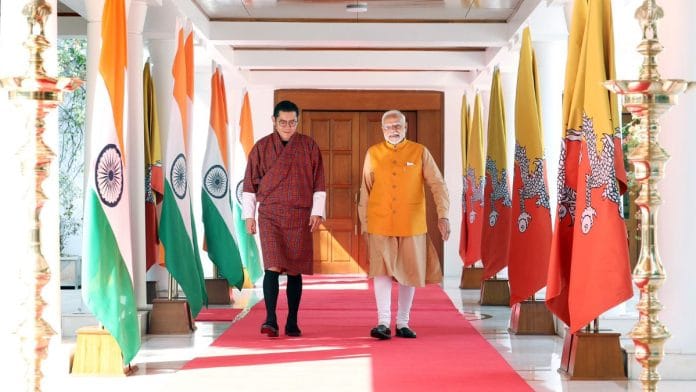New Delhi: The Gelephu Special Administrative Region, hydropower and other renewable energy projects, trade and space technology were among the areas that featured in the conversation between Prime Minister Narendra Modi and the King of Bhutan Jigme Khesar Namgyel Wangchuk Thursday.
The King and Queen of Bhutan are on a two-day visit to India from 5 to 6 December. Bhutan’s Minister of Energy and Natural Resources Gem Tshering also travelled as a part of the delegation, indicating the importance placed on the energy sector in ties between the two countries.
“They expressed satisfaction that the 1020 MW Punatshangchhu-II hydro power project was nearing completion, and looked forward to its commissioning in the near future. The leaders agreed on the need for early conclusion of the Punatsangchhu-I hydro power project,” read the joint statement released by the two leaders after their bilateral meeting.
It added: “The two sides reiterated the importance of cooperation in the hydropower sector, and their commitment to advancing it, including through finalising modalities urgently for new projects, including reservoir hydro projects.”
Clean energy is one of the major areas where the two countries share a bilateral relationship. The two leaders also reviewed the whole gamut of non-hydro renewable energy ties, including potential strategic partnerships between Indian and Bhutanese firms, which would give the entities in Thimphu access to financing and energy markets from New Delhi.
The Gelephu Mindfulness City project—a project the King of Bhutan has a personal interest in—was also discussed by the two leaders, with Modi reassuring “His Majesty” of India’s “continued support” that would “bring prosperity and well-being in Bhutan and also the border areas”.
Earlier this year, India had announced that it will double its financial support to the Himalayan kingdom—from Rs 5,000 crore to Rs 10,000 crore—between 2024 and 2029. The announcement by Modi of the hike in financial support came a few months after the previous government in Bhutan picked up pace in finalising the demarcation of borders between Thimphu and Beijing, including in the Doklam plateau, where the armies of India and China had a tense standoff in 2017.
China has been constructing a number of villages in the territory of Bhutan, near the tri-junction area with India. As reported by ThePrint earlier, there are at least six such villages.
“The Bhutanese side thanked GoI for stepping up the development support for Bhutan under the 13th Five Year Plan (2024-29) and India’s support for RGoB’s Economic Stimulus Programme,” read the joint statement.
The first Integrated Check Post (ICP) between New Delhi and Thimphu in Assam’s Darranga, which was opened last month, was also discussed by the two leaders as a project that could boost “connectivity and tourism” in Eastern Bhutan.






